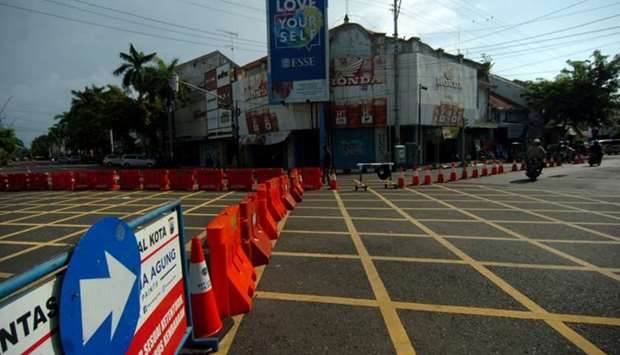* Indonesia says regional authorities to gain lockdown powers
* Says also considering plan to ban mass exodus at end of Ramadan
* Indonesia sees biggest daily rise in confirmed coronavirus cases
Indonesia's chief security minister Mahfud MD said on Friday the national government would allow regional authorities to impose lockdowns to control the coronavirus, in a major shift in strategy after previously resisting tougher restrictions.
The security chief also said the government was mulling a plan to ban "mudik" - the practice that sees millions of Indonesians leave towns and cities for their native villages at the end of the Muslim fasting month of Ramadan in May.
The change of tack came after Indonesia, the world's fourth most populous nation, announced on Friday its biggest one-day surge in coronavirus cases, up 153 to 1,046.
Indonesia's government has previously been reluctant to embrace the stricter containment strategies of other nations, and President Joko Widodo's policy has been to encourage social distancing while not imposing tighter restrictions on movement.
But its eastern province of Papua defied Jakarta on Thursday by closing its airports, sea ports and land borders for 14 days in an attempt to prevent the coronavirus from spreading.
After the central government initially sought to over-rule Papua's moves, Mahfud told reporters on Friday that Jakarta would now issue a regulation allowing regional governments to impose a strict quarantine on their territory.
"It will regulate when regional areas can declare movement limitation, which is commonly known as a lockdown," Mahfud said.
In a later statement obtained by Reuters, Mahfud said the government was approving a "regional quarantine", not a lockdown.
Indonesia has only conducted 4,336 tests, a fraction of those done by many other nations. One model by infectious disease experts suggests there are as many as 50,000 cases. Indonesia has a total population of more than 260 million.
Hundreds of thousands of residents of Jakarta, where most confirmed cases of coronavirus have been clustered, have left over the past week for their home villages to find a safe haven, or after losing their jobs, officials said.
In response, local governments took matters into their own hands.
The mayor of Tegal, a city in Central Java, this week closed 49 access points and shut public spaces until July 30 after a local returned from Abu Dhabi with the coronavirus.
"People need to understand the policy I took. If I had to choose, I'd rather be hated by people than let them die," the mayor, Dedy Yon Supriyono, was quoted by CNN Indonesia as saying.
In Papua, the decision to close its borders was taken in consultation with the police and the military, documents showed.
Papua's four airports and sea ports were closed on Thursday and remained shut on Friday, a government official said.
Ahmad Syarif Syechbubakr, a Jakarta-based analyst with Bower Group Asia, said Widodo was "very concerned about the economic impact of the lockdown" and his advisers saw a risk of social unrest by millions of informal workers like street hawkers and labourers if movement is restricted.
The University of Indonesia's Pandu Riono said authorities must cancel the "mudik."
"Many people going home are likely to come from a place that's infested with the virus," he said.

